
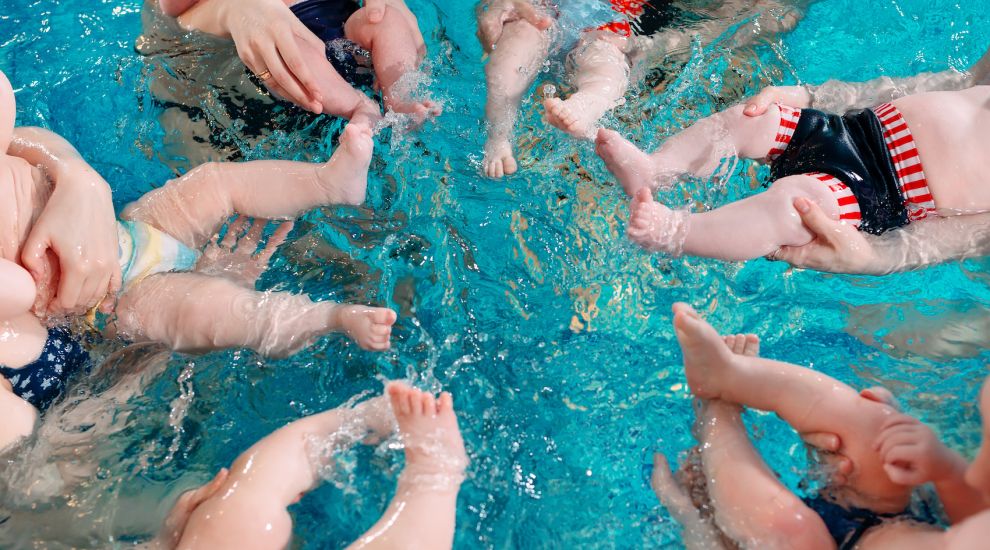

With Jersey's birth rate plummeting to its lowest level in nearly 30 years and the average age of first-time mothers among the oldest in Europe, new parents across the island are grappling with unique challenges...
Express caught up with some of them to find what it is like to be a mum in Jersey today.
Jersey's birth rates have fallen to their lowest level since 1995, with just 799 births recorded in 2023 – a 29% decline from the 2012 peak of 1,124.
The average age of first-time mothers has also risen to nearly 32, making Jersey’s new mothers among the oldest in Europe – with six in 10 local women having their first child aged between 30 and 39.
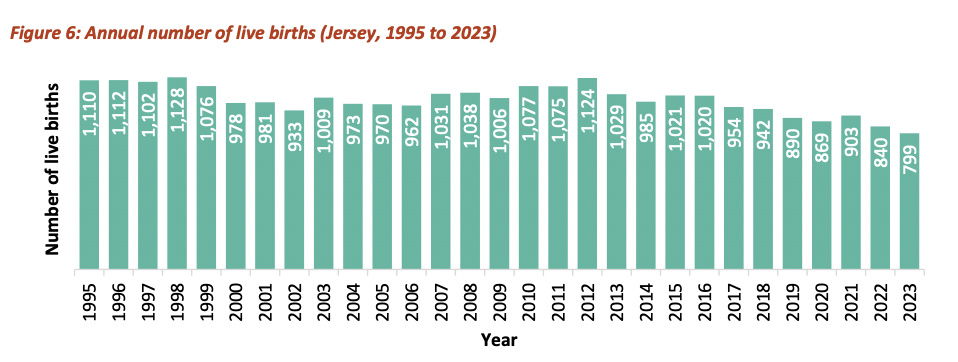
Pictured: The number of live births in Jersey in 2023 is the lowest since 1995, marking a 29% decline from the peak in 2012. (Public Health)
These figures were published last month in the Women’s Health and Wellbeing Joint Strategic Needs Assessment – a 59-page document that aimed to highlight factors and challenges affecting women's health.
The Births and Breastfeeding Profile report, which was published last year, also revealed that the proportion of women having a baby in their 20s has nearly halved in recent years.
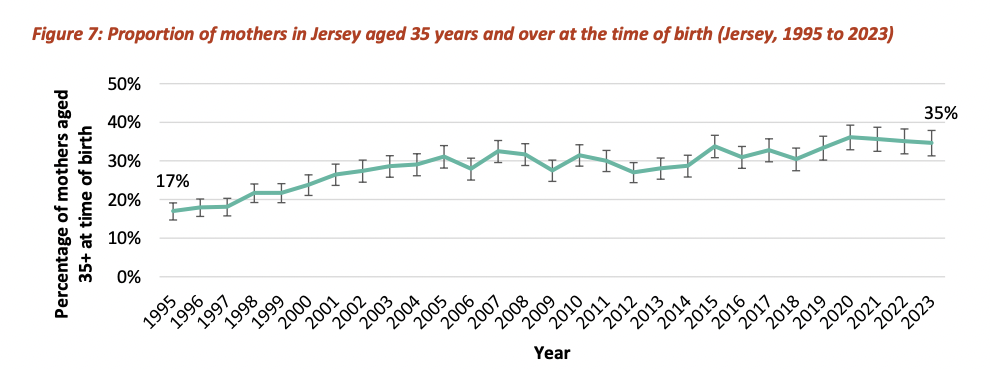
Pictured: Jersey has seen a steady increase in maternal age. (Public Health)
While the Women's Health Assessment did not look specifically at loneliness among mothers, it did reveal some concerning statistics about women's mental health – with 40% reporting unmet mental health needs, and only 27% feeling their needs are adequately addressed.
It also found that a quarter of women report frequent feelings of loneliness and low life satisfaction.
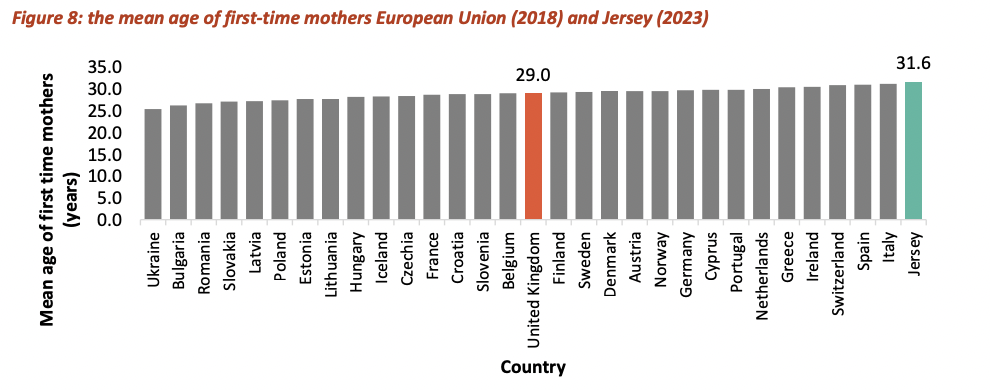
Pictured: The average age of first-time mothers in Jersey was 31.6 years in 2023, higher than all EU countries. (Public Health)
These findings come as some new mothers have reported facing increasing challenges around support systems, increasing costs and feeling lonely.
Express caught up with some of them to find out how they have felt since becoming a mum – what’s been challenging, what has helped, and what could be done to improve their experiences...
Nyah Whittingham, a 23-year-old mental health advocate and mother to two-year-old Birdie, said she was "definitely not surprised" by the figures.
When asked for her thoughts on what was driving up the age of first-time mothers, she said that Jersey's high cost of living and wanting to feel "ready" were often behind the decision to delay parenthood.
Pictured: Nyah Whittingham is 23 years old, and her daughter Birdie will turn three next month.
“People want to feel financially secure, emotionally mature, and stable in their life situation before having children,” she explained.
"The cost of living is a huge factor as to why people delay starting or growing their families in Jersey.
"People are choosing to delay parenthood until it feels like less of a sacrifice."
Local gynaecologists have previously warned that Jersey's high cost of living is contributing to delayed parenthood – potentially leading to increased infertility rates and demographic challenges.
With birth rates at their lowest since 1995, a steady outflow of young adults from the island, and an ageing population, concerns are growing about how Jersey will care for its older population in future without a large enough working population.
While Nyah embraced motherhood at age 20, she acknowledged that being a young mum comes with its own hurdles due to their being fewer young families on the island.
“I definitely feel lonely as a young mum," she said.
"Not lonely in the sense that I have nobody to turn to, but lonely in the sense that none of my [childhood] friends have babies, or really understand what it means to be a mum.
"I often feel as if I’m figuring things out alone. Being a ‘young’ mum can feel isolating on an island where the majority of mums are aged 30/35+.
“I have made incredible mum friends who are older than me and I don’t think age should affect the relationships we have with people, but there is definitely a sense of loneliness as a young mum in Jersey, especially as there aren’t many younger families here.”
Chloie Houiellebecq, who had her first child at 17, agreed that younger mothers can particularly struggle to find peers in similar situations.
She said: “Being a young mum is so challenging, your support network is shortened because of the feelings of not being able to associate with other parents, the constant battle of not feeling like you’re doing well enough.
“It gets so lonely. You find it so hard to find other parents and almost feel as if you shouldn’t attend baby groups because you're young and it’s a constant cycle”.
Niamh Troy, who found out she was pregnant when she was 21, has also felt isolated at times and struggled with a lack of support.
She explained that “entering a completely new chapter of my life that none of my friends had experienced” was a “massive challenge”.
“I felt isolated as I had no one to relate to or talk to about those feelings and changes to my body which was very hard at times," she added.
Niamh explained: “As I was 21, a lot of my friends were out drinking and enjoying their 20s whilst I was preparing for a massive life change.
"I was completely ready to take the leap but it was hard to not have anyone to connect with to ask questions or just talk to about it all.”
However, she has described feeling "judged" by others who "jump to conclusions" as the "biggest challenge" she has faced as a young mother.
Niamh said: "I’ve had people asking if I’m nannying or babysitting whilst in shops due to my age and people often stare in a very obvious judgmental manner which makes me instantly feel shameful.”
While some younger mothers report struggles with social isolation due to a lack of peers in similar circumstances – with the proportion of women having a baby in their 20s nearly having halved in recent years – it is also the case that mothers of all ages face their own hurdles.
Local mother Andra Marasteanu said: “There are so many variables in people’s lives. Age definitely does not automatically come with a support network through motherhood.
“It can be very lonely and overwhelming at any age. And support for mums is not much.”
Many mothers, regardless of age, have reported gaps in support for parents as being key challenges, especially when it comes to affordability and accessibility.
Lauryn Quinn, who had her daughter in February last year, spoke about the high cost of childcare and the lack of child-friendly facilities as major obstacles.
“Childcare should be fully funded by the government,” she said. “Children are essential to the economy, but it’s also essential for parents to return to work when they feel they can.
"Personally, I would love to return to work a few days a week. However, due to childcare, I can’t. If it was free and fully funded I would be able to do that.
"Some mums feel they can go back earlier than others, and I don’t feel they should be restricted by childcare costs.”
Hannah Jane Buesnel (35) added: “The cost of childcare is also so high, we now have two children in nursery part-time, only for a couple of days but costs more than most mortgages.”
Other parents, like Jade Brindle (35) who recently had twins, face similar challenges.
"Nursery fees are so high and we are going to struggle massively but I have to go back to work in September," she said.
"I would stay off longer with my babies but I also want to ensure my career isn’t affected."
Tori Ducker-Collins, who had her child at 32, also explained that many support services are inaccessible to working mothers.
“Support networks can be challenging as events for mums cost a lot, and they are often run during the day, so if you’ve returned to work you can’t access them, and going out with your baby can be overwhelming.”
Despite these challenges, many mothers have found solace and strength in community – whether through formal groups, online communities, or friendships.
For many, these connections go beyond age with shared experiences bringing new mothers together.
Lisa Williamson, who became a mother at 30, shared that local groups such as 'Birthable', which offers postnatal workout classes, and 'Mum to 5K', a 12-week exercise programme offering childcare support to help new mothers train, have played a key role in her postpartum journey.
Charlotte Pinel-Laframboise, 34, shared that she has formed friendships with younger mums – adding that age is irrelevant to their connection.
"Age is just a number to us," she said. "It makes no difference to our friendship or how we support each other on our parenting journeys.
"You'll find that a lot as it isn't our age that brings us together."
Other mothers have also found creative ways to build support networks.
Katie Le Herissier, for example, connected with other parents through baby massage classes, which became an important source of support and understanding.
The new mother said: "Having a group of women all with babies the same age and experiencing the same things has been such a good support network, we created a WhatsApp group and talk about all sorts!
“Some days it’s the support of these women that spurs me on to get up and get out as it’s so easy to just not leave the house, the days blur into one!
“We are also in a really lucky position where we have a big support network but know that isn’t the case for a lot of mums.”
Katie acknowledged, however, that while "great communities" exist, accessing them isn’t always straightforward.
“It also has a lot to do with finances and finding the courage every day to get up and get out,” she explained.
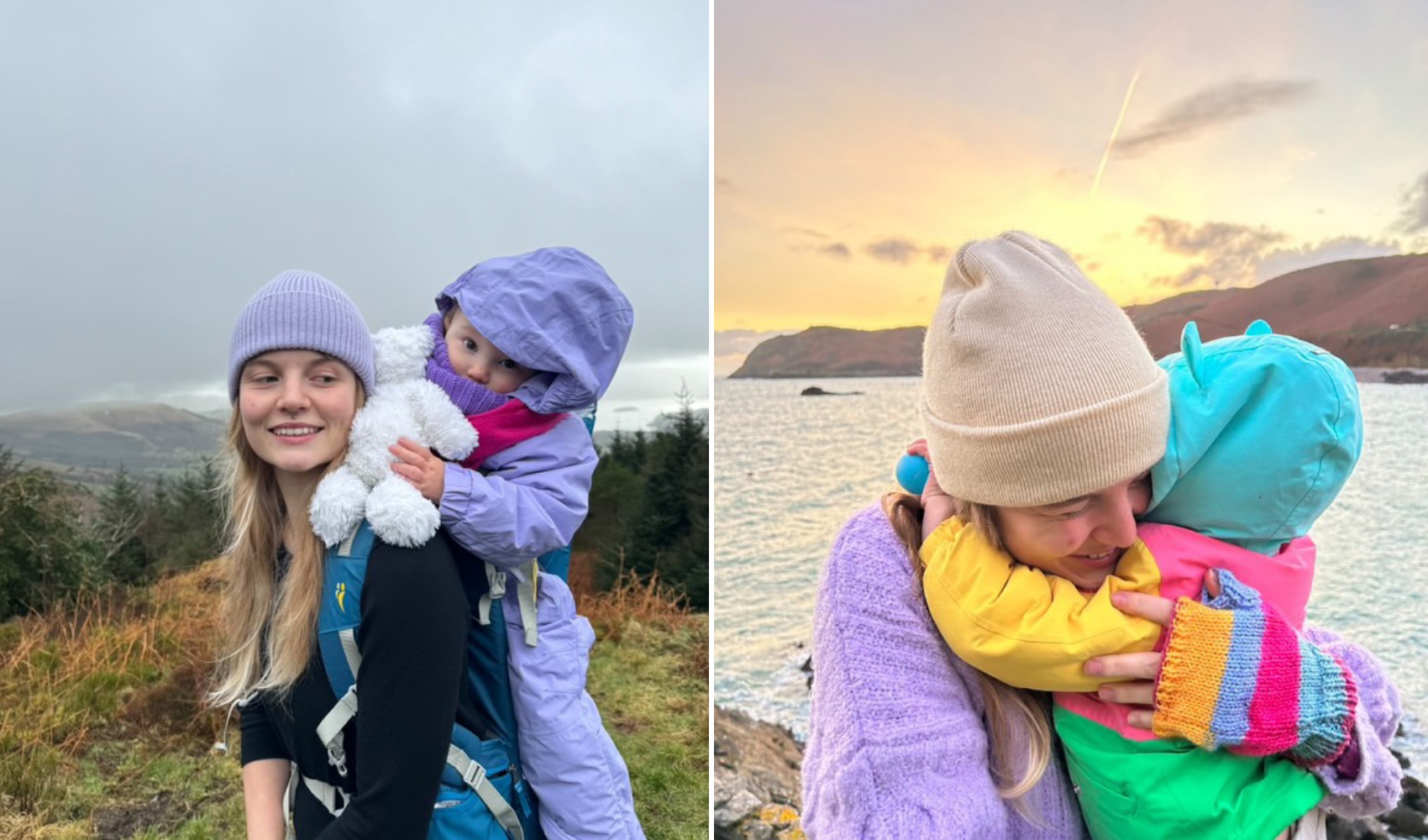
Pictured: Local mum Nyah runs a positive community group for other parents on social media.
For many, online platforms and social media have become important tools for connection.
Nyah, who herself runs a social media page for mums, explained: “Social media has been an incredible resource for me to meet and talk to new mums in Jersey but also the UK and beyond.”
For those mothers feeling isolated, Nyah advises them to reach out, whether through social media, local groups, or mental health services such as the Listening Lounge and Jersey Talking Therapies.
“We aren’t supposed to do motherhood alone,” she said.
“Sisterhood among mothers is so important in a society where women feel expected to get on with it alone.”
DIGEST: New report uncovers "systemic gender inequalities
Comments
Comments on this story express the views of the commentator only, not Bailiwick Publishing. We are unable to guarantee the accuracy of any of those comments.